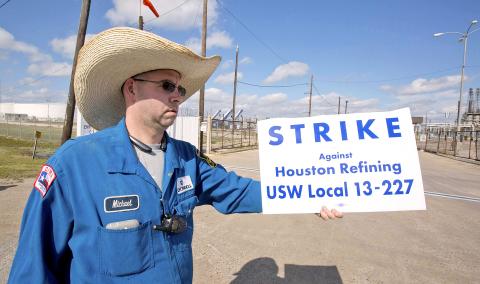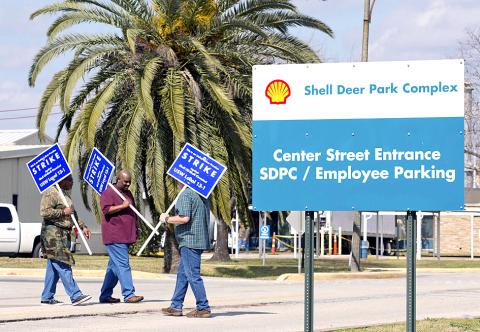The strike by oil workers at plants that account for 10 percent of US refining capacity entered its second day yesterday in the biggest walkout since 1980. Crude futures fell.
The United Steelworkers (USW) union that represents employees at more than 200 refineries, terminals, pipelines and chemical plants stopped work on Sunday at nine sites after failing to agree on a renewed labor contract. The union rejected five offers made by Royal Dutch Shell PLC on behalf of companies including ExxonMobil Corp and Chevron Corp since talks began on Jan. 21.
The USW has not called a strike nationally since 1980, when a stoppage lasted three months.

Photo: Reuters
While only one of the nine plants has curbed production amid the stoppage, a full walkout of USW workers would threaten to disrupt as much as 64 percent of US fuel output.
Shell and union officials began negotiations amid the biggest collapse in oil prices since 2008.
“If the strike escalates, that would be detrimental to the oil price,” David Lennox, a resource analyst at Fat Prophets in Sydney, said by telephone. “It will put high US production out on the market and there is nowhere for it to go.”

Photo: Reuters
US benchmark West Texas Intermediate oil fell as much as US$1.57 per barrel, or 3.3 percent, to US$46.67 in electronic trading on the New York Mercantile Exchange. It jumped 8.3 percent on Friday last week, the biggest one-day advance since June 2012.
Gasoline for March delivery slid US$0.233 per gallon, or 1.6 percent, to US$1.4555, and the diesel contract for the same month was US$0.189 lower at US$1.6819.
The refineries on strike can produce 1.82 million barrels of fuel per day, data compiled by Bloomberg show. They span the US, from Tesoro Corp’s plants in Martinez, California; Carson, California; and Anacortes, Washington; to Marathon Petroleum Corp’s Catlettsburg complex in Kentucky and three sites in Texas, according to the USW’s statement.
In Texas, Shell’s Deer Park complex, Marathon’s Galveston Bay plant and LyondellBasell Industries NV’s Houston facility have been affected, the union said. LyondellBasell activated its work continuation plan, spokesman George Smalley said on Sunday.
Tesoro will shut down remaining processing units at its Martinez, California, refinery in the next 24 hours, company spokeswoman Destin Singleton said in an e-mailed statement.
The 166,000 barrel-per-day refinery already had about half its capacity offline for planned maintenance, Singleton said.
More refineries are standing by to join the sites on strike, according to two people familiar with the plan who asked not to be identified because the information is not public.
Shell remained “committed to resolving our differences with USW at the negotiating table and hope to resume negotiations as early as possible,” Ray Fisher, a spokesman for The Hague-based company, said by e-mail on Saturday.

Intel Corp chief executive officer Lip-Bu Tan (陳立武) is expected to meet with Taiwanese suppliers next month in conjunction with the opening of the Computex Taipei trade show, supply chain sources said on Monday. The visit, the first for Tan to Taiwan since assuming his new post last month, would be aimed at enhancing Intel’s ties with suppliers in Taiwan as he attempts to help turn around the struggling US chipmaker, the sources said. Tan is to hold a banquet to celebrate Intel’s 40-year presence in Taiwan before Computex opens on May 20 and invite dozens of Taiwanese suppliers to exchange views

Application-specific integrated circuit designer Faraday Technology Corp (智原) yesterday said that although revenue this quarter would decline 30 percent from last quarter, it retained its full-year forecast of revenue growth of 100 percent. The company attributed the quarterly drop to a slowdown in customers’ production of chips using Faraday’s advanced packaging technology. The company is still confident about its revenue growth this year, given its strong “design-win” — or the projects it won to help customers design their chips, Faraday president Steve Wang (王國雍) told an online earnings conference. “The design-win this year is better than we expected. We believe we will win

Chizuko Kimura has become the first female sushi chef in the world to win a Michelin star, fulfilling a promise she made to her dying husband to continue his legacy. The 54-year-old Japanese chef regained the Michelin star her late husband, Shunei Kimura, won three years ago for their Sushi Shunei restaurant in Paris. For Shunei Kimura, the star was a dream come true. However, the joy was short-lived. He died from cancer just three months later in June 2022. He was 65. The following year, the restaurant in the heart of Montmartre lost its star rating. Chizuko Kimura insisted that the new star is still down

While China’s leaders use their economic and political might to fight US President Donald Trump’s trade war “to the end,” its army of social media soldiers are embarking on a more humorous campaign online. Trump’s tariff blitz has seen Washington and Beijing impose eye-watering duties on imports from the other, fanning a standoff between the economic superpowers that has sparked global recession fears and sent markets into a tailspin. Trump says his policy is a response to years of being “ripped off” by other countries and aims to bring manufacturing to the US, forcing companies to employ US workers. However, China’s online warriors